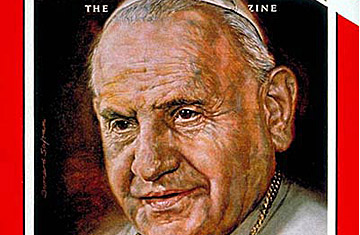
Pope John XXIII
(4 of 7)
But at the end of the council session, Pope John was obviously pleased; the council, he said, had enabled him "to hear the voice of the whole Catholic world." To make sure that the next session would go faster, he set up a new secretariat under his Secretary of State, Amleto Cardinal Cicognani, to carry on council deliberations until the council fathers reconvene on Sept. 8. To each bishop he arranged to send all proposals during the recess, in a sort of continuing council by mail order. As for the disagreements that the council had produced, John dismissed them by saying, "We are not friars singing in a choir."
POPE JOHN: INTUITIVE BEING
Though Pope John has proved a happy surprise to both the Catholic Church and the world, his life is full of signposts that clearly mark his life and growth. He is an intuitive being who can pierce to the heart of a matter without taking the circuitous route of deeper and more discursive minds. The rhythmic natural influences of his first years on the farm at Sotto il Monte formed him for all time. A few weeks ago, asked by some bishops what he wanted to do after the council, John replied: "Spend a day tilling the fields with my brothers." Neither an intellectual nor a highly trained theologian, he does not think in concepts but in terms of fundamental human experiences. In a varied and unusual career, he has absorbed and synthesized these experiences to an extraordinary degree.
Unlike most Popes, Angelo Giuseppe Roncalli has spent most of his life living away from the restrictive influences of Rome. He has come to respect and be respected by people of many beliefs. After a year of teaching patrology (the study of early church fathers) at the Pontifical Lateran Seminary in Rome as a young priest, he was removed because the Romani did not consider him quite safe—he was proposing such unthinkable ideas as that mixed marriages might be allowed in certain circumstances. He languished as a letter copier in the Oriental Congregation until the Holy See discovered that it needed an apostolic visitor to remote Bulgaria (1925-34). From there he went for ten years to 98 % -Moslem Turkey, and was transferred from exile to troubled France near the end of World War II only because the Holy See did not want to spare a top man for that messy post. But the French were charmed by Roncalli's humility and abilities as a raconteur—as well as by his reputation as "a heavy fork"—and in 1953 Pius XII gave him a red hat and the metropolitan see of Venice.
Everywhere, John has always made a point of meeting and fraternizing with non-Catholics and "anyone who does not call himself a Christian but who really is so because he does good." While in Turkey,
